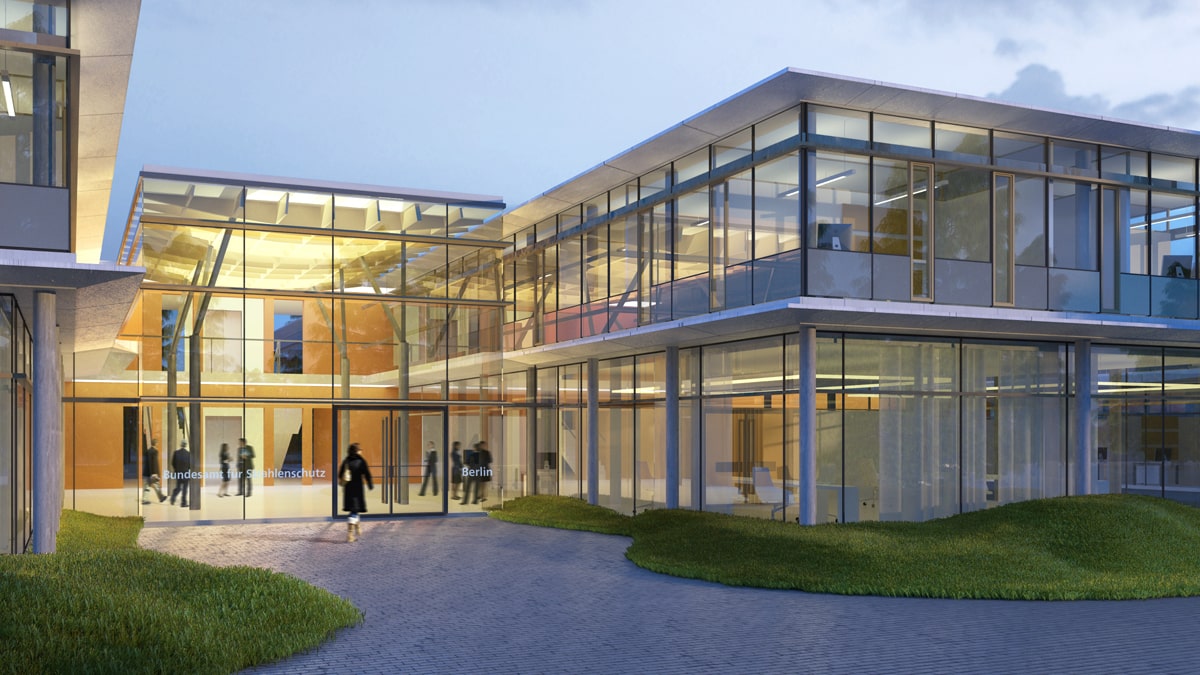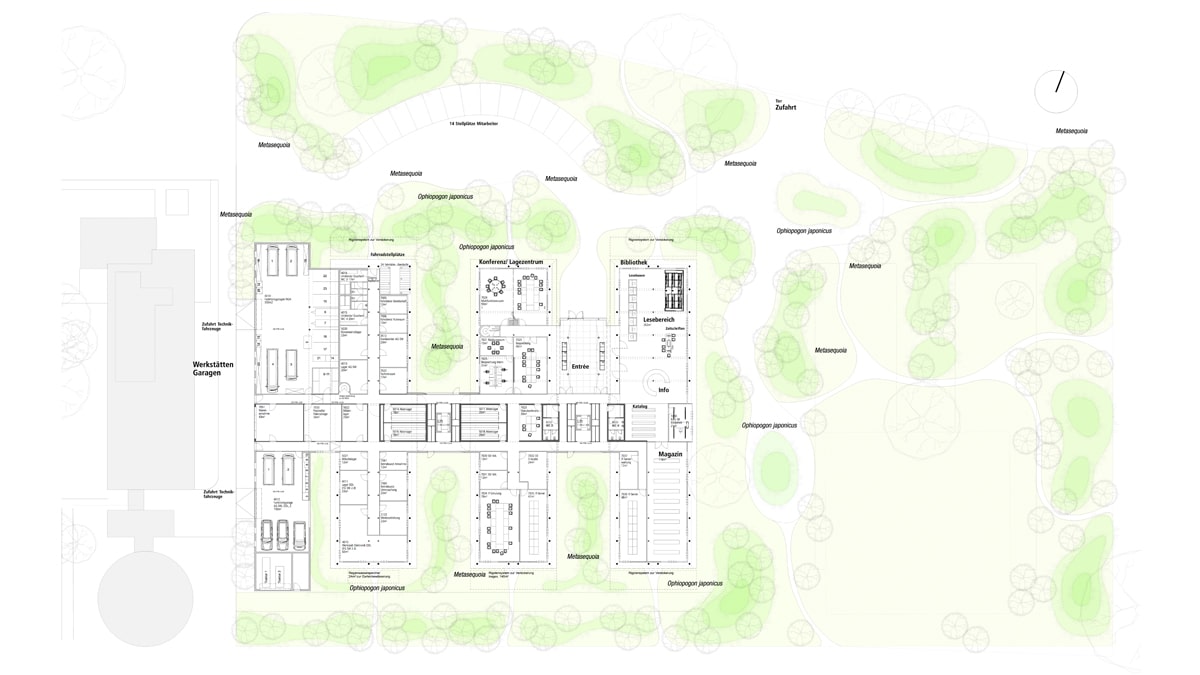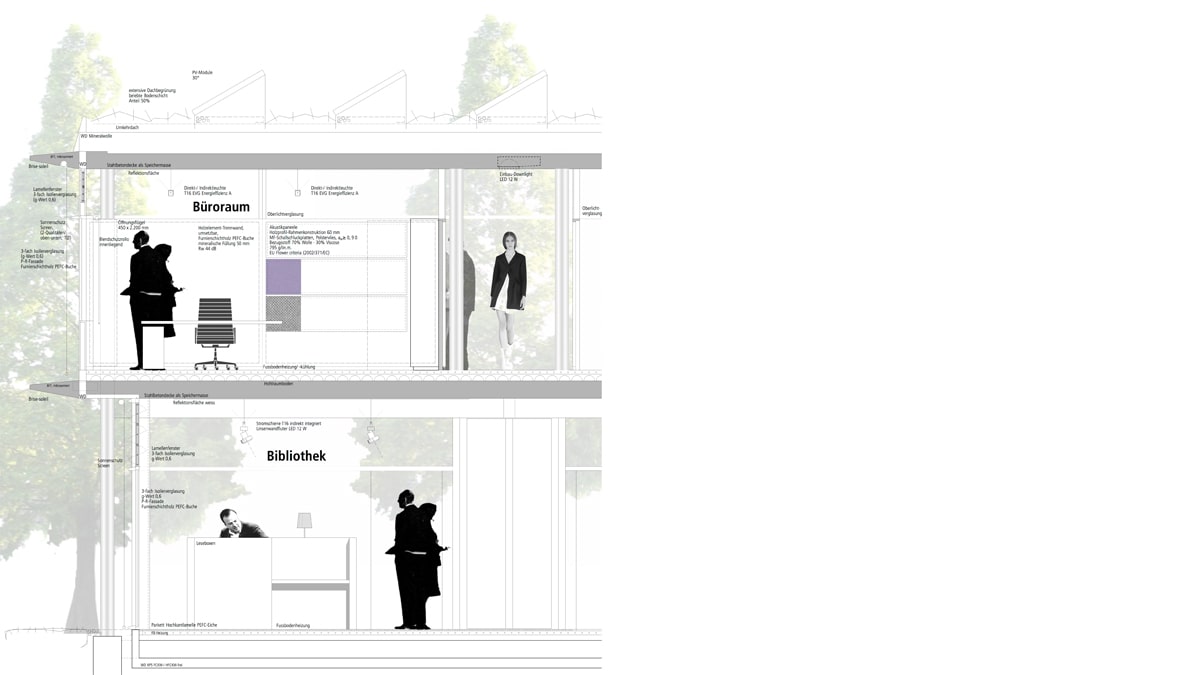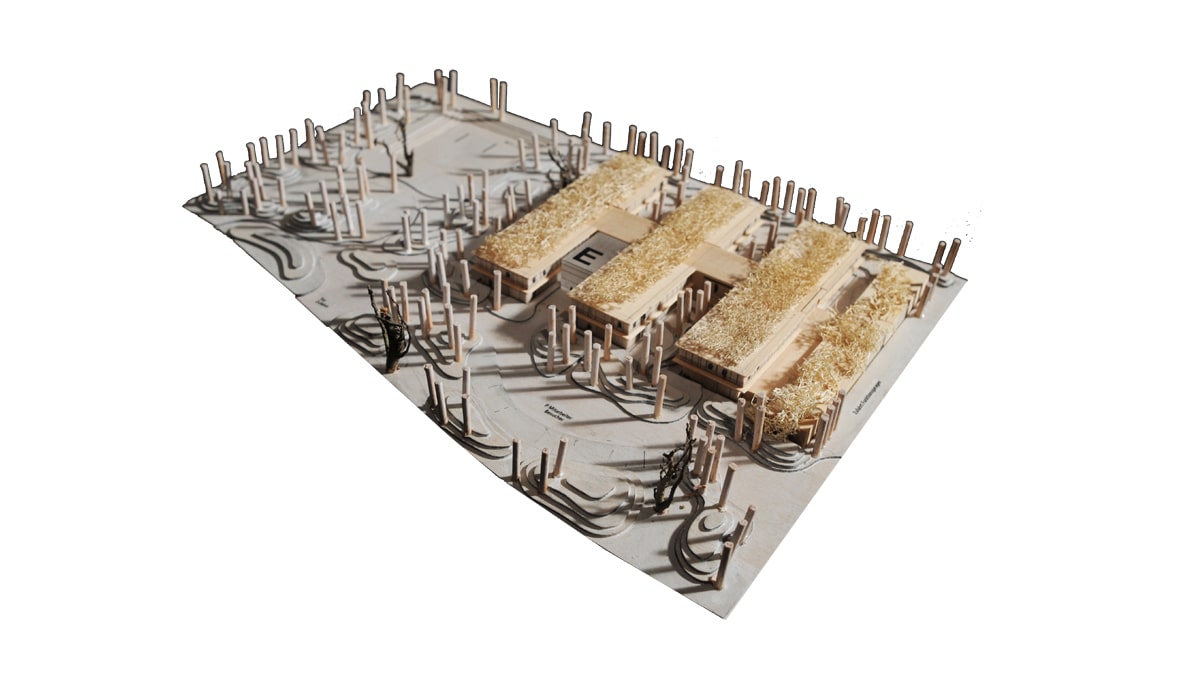With our competition entry for the new building “Federal Office for Radiation Protection” we wanted our concept to transform the situation in Karlshorst, which is characterized by decades of use as barracks, into an Arcadian environment in which employees and visitors like to stay and feel good. The concept of the building structure includes a CO2 neutral standard based on very lean technology. Thanks to balanced land management, the entire excavation remains on the site and forms the basis for the new topography.
Federal Office for Radiation Protection Berlin
With our competition entry for the new building “Federal Office for Radiation Protection” we wanted our concept to transform the situation in Karlshorst, which is characterized by decades of use as barracks, into an Arcadian environment in which employees and visitors like to stay and feel good.
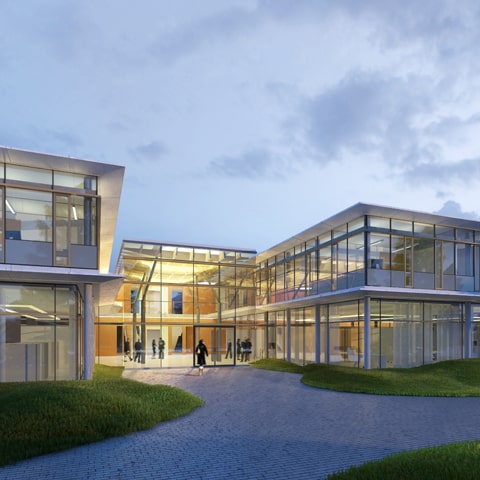
BSB
design competition
2012–2013
data
gross cubic volume 20,150 m3, usable floor space 3,526 m2
issuer
Bundesanstalt für Immobilienaufgaben, Berlin/ Bundesamt für Bauwesen und Raumordnung, Berlin
structural engineering
Bollinger+Grohmann GmbH, Frankfurt
energy concept/ building services engineering
Solares Bauen GmbH, Freiburg i. Br.
fire prevention concept
Hagen Ingenieure für Brandschutz, Kleve
landscape planning
Wirtz International nv,
Schoten, Belgien
rendering
Emptyform, Darmstadt
model making
Cornelsen+Seelinger Architekten
With our competition entry for the new building “Federal Office for Radiation Protection” we wanted our concept to transform the situation in Karlshorst, which is characterized by decades of use as barracks, into an Arcadian environment in which employees and visitors like to stay and feel good. The concept of the building structure includes a CO2 neutral standard based on very lean technology. Thanks to balanced land management, the entire excavation remains on the site and forms the basis for the new topography.
Metasequoia – Landscape space
The concept developed with Peter Wirtz of Wirtz International, provides a close-to-nature park that organically surrounds the building. A clear forest of Metasequoia glyptostroboides (Chinese redwood) characterizes the outside area. The trees are in groups and are integrated in the new topography of arched islands planted with Ophiopogon japonicus (Mondo Grass). By means of their grouping together, their clear shape and the property of the seasonal discoloration, they form a poetic environment for the new building. The garden with its paths, green spaces and lawns is an invitation to stroll, relax and talk.
Efficient design
Energy-intensive designs are only used for construction in the necessary areas such as foundations, floor slabs and ceilings. This brings clear advantages in terms of economy and building physics (acoustics, thermal storage behavior, etc.). The differentiation in structure and expansion supports the desired flexibility and offers an optimized basis for the life cycle of the entire building by separating the systems (long-term/short-term). The proposed use of the movable partition walls made of solid wood (sandwich construction with a qualified structure) on the installation floor with integrated surface heating favors the room climate and longevity due to the high absorption capacity.
Energy concept
Lean building technology is made possible by an intelligent energy concept: The solid concrete ceilings are largely exposed and are thus active as internal storage masses; they dampen the temperature fluctuations and thereby contribute to a pleasant room climate. The louver windows in the upper area of the facade are used at night for cooling. The user-friendly, efficient sun protection technology (Brise-soleil, TLT elements with external sun protection) ensures pleasant lighting and temperature conditions.
Groundwater is used for heating and cooling (office areas only) by means of an earth probe system. The system consists of a field with 21 probes that can best use the groundwater. A PV system on the roof areas with an output of 145 kWp covers 100% of the energy requirements according to EnEV. The use of regenerative energy systems and a variety of energy saving technologies limit the primary energy requirement to approx. 100 kWh/ma. This primary energy requirement is completely and regeneratively covered by the photovoltaic system on the building. In this way, a CO2 neutral building standard (zero emissions standard) has been achieved.
The complete utilization of rainwater is ensured by green roofs, French drain infiltration and use of rainwater for garden irrigation.
Metasequoia – Landscape space
The concept developed with Peter Wirtz of Wirtz International, provides a close-to-nature park that organically surrounds the building. A clear forest of Metasequoia glyptostroboides (Chinese redwood) characterizes the outside area. The trees are in groups and are integrated in the new topography of arched islands planted with Ophiopogon japonicus (Mondo Grass). By means of their grouping together, their clear shape and the property of the seasonal discoloration, they form a poetic environment for the new building. The garden with its paths, green spaces and lawns is an invitation to stroll, relax and talk.
Efficient design
Energy-intensive designs are only used for construction in the necessary areas such as foundations, floor slabs and ceilings. This brings clear advantages in terms of economy and building physics (acoustics, thermal storage behavior, etc.). The differentiation in structure and expansion supports the desired flexibility and offers an optimized basis for the life cycle of the entire building by separating the systems (long-term/short-term). The proposed use of the movable partition walls made of solid wood (sandwich construction with a qualified structure) on the installation floor with integrated surface heating favors the room climate and longevity due to the high absorption capacity.
Energy concept
Lean building technology is made possible by an intelligent energy concept: The solid concrete ceilings are largely exposed and are thus active as internal storage masses; they dampen the temperature fluctuations and thereby contribute to a pleasant room climate. The louver windows in the upper area of the facade are used at night for cooling. The user-friendly, efficient sun protection technology (Brise-soleil, TLT elements with external sun protection) ensures pleasant lighting and temperature conditions.
Groundwater is used for heating and cooling (office areas only) by means of an earth probe system. The system consists of a field with 21 probes that can best use the groundwater. A PV system on the roof areas with an output of 145 kWp covers 100% of the energy requirements according to EnEV. The use of regenerative energy systems and a variety of energy saving technologies limit the primary energy requirement to approx. 100 kWh/ma. This primary energy requirement is completely and regeneratively covered by the photovoltaic system on the building. In this way, a CO2 neutral building standard (zero emissions standard) has been achieved.
The complete utilization of rainwater is ensured by green roofs, French drain infiltration and use of rainwater for garden irrigation.
